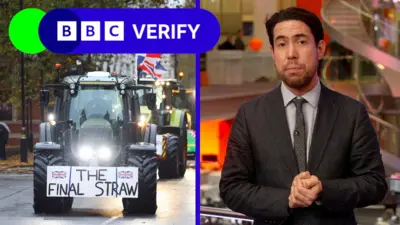We've updated our Privacy and Cookies Policy
We've made some important changes to our Privacy and Cookies Policy and we want you to know what this means for you and your data.
Blue badges: campaign against disabled parking abuse
New plastic blue badges with extra security features are being introduced in Wales to help tackle abuse of parking for disabled drivers.
The badges will be harder to forge or be used fraudulently when they are brought in next month
Police and parking wardens can check them on the spot against a national database if they suspect abuse.
Welsh government ministers say the badges will be free, unlike some in England and Scotland.
'Pain and inconvenience'
The current handwritten card badges will be replaced by plastic, electronically-printed photo ID versions as disabled drivers renew them over the next three years.
A UK government report has highlighted widespread abuse of the system which created problems for disabled people and cost ÂŁ46m a year in parking fee evasion.
Transport Minister Carl Sargeant said: "When people abuse blue badges, or use disabled parking spaces they're not entitled to, they are seriously affecting the quality of life of those individuals who legitimately carry badges.
"Blue badges allow people in genuine need to live independent lives, and by invading blue badge spaces, other drivers are actually causing not just great inconvenience to the disabled person, but also physical pain."
The campaign is supported by Paul Davies, a former soldier who was paralysed from the waist down after being injured in a military rugby game in 1983.
Mr Davies, from Bargoed, said he regularly encountered people parking illegally in disabled spaces.
"Drivers take no notice of the signs, either because of laziness or ignorance of how difficult it really can be for a disabled person to park in a normal space."
Announcing plans for the improved blue badges in December, Mr Sargeant said they would be provided free of charge as a measure to tackle poverty, saying disabled people were almost twice as likely to live in low-income households.
New-style badges were introduced in England and Scotland in January, where local councils can charge up to ÂŁ10 and ÂŁ20 respectively for supplying them.
In Wales, it has been suggested that local authorities could be able to fund the scheme by scrapping.
Welsh government sources acknowledged criticism from the National Union of Journalists that newspapers could suffer if they lost a source of advertising income worth more than ÂŁ1m a year.
Old-style disabled parking badges cost ÂŁ2, with around 230,000 in circulation in Wales.
Although the new badges will be supplied free of charge, local authorities will be allowed to charge ÂŁ10 for organisational badges or to replace lost badges.
A new national helpline for general inquiries about blue badges - 0844 4630215 - will be introduced on 1 April.
Top Stories
More to explore
Most read
Content is not available








